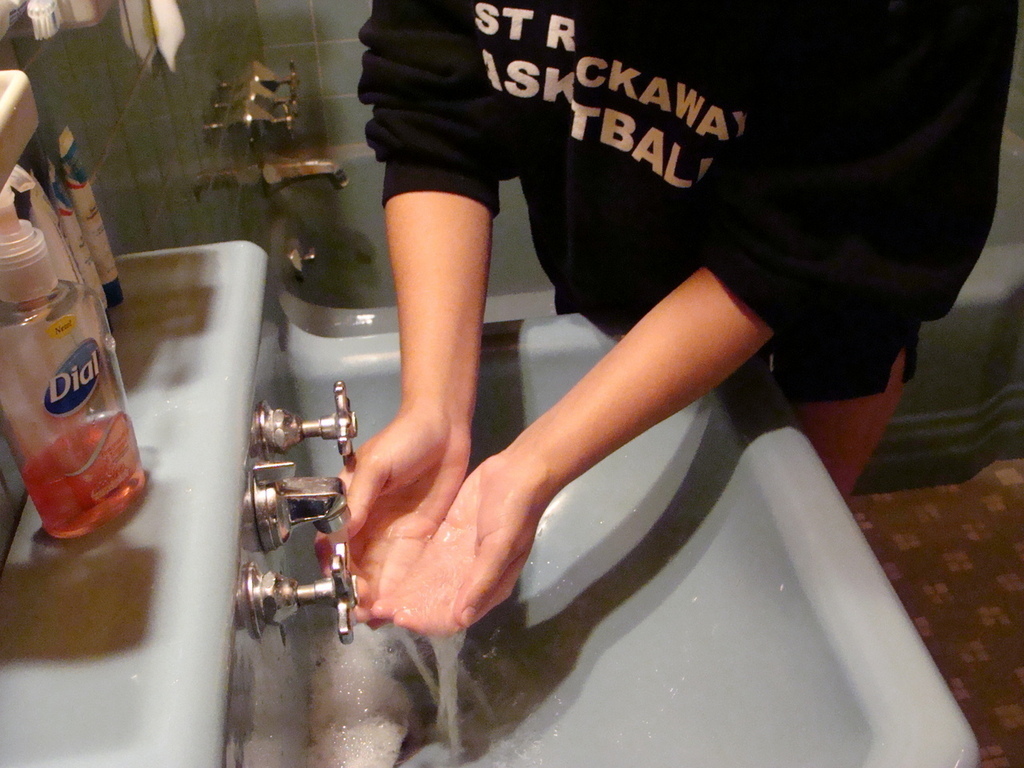Ready for swine flu, round 2
Textbooks, pencils, calculators ... and face masks?
Administrators, teachers and students are gearing up for a new school year with one more thing on their minds: how to stay healthy, especially with warnings about the H1N1 virus, or swine flu, as it’s more commonly known.
East Rockaway School District Superintendent Dr. Roseanne Melucci said that school staffs will continue the practices they put in place last spring, monitoring illnesses, watching the attendance records of students and teachers and consulting with the schools’ nurses and doctor.
“We want the students to practice what we call ‘respiratory etiquette’ — good hand washing, minimal touching, and staying home if they’re sick,” Melucci said. “The new guidelines tell us that anyone, student or staff, should stay home at least 24 hours after a fever breaks. We’re all in this together.”
She advocated rest, exercise and good health habits to ward off illness, and added, “Any student displaying flu symptoms will be referred by the school nurse to their primary health care provider.”
What are officials doing?
Nassau County Executive Thomas R. Suozzi, along with county, village, school and health officials, announced last week that the county had purchased refrigerators to store H1N1 vaccines, which are expected to be released by the Centers for Disease Control in October. The county expects to receive enough vaccines for residents who fall into high-risk categories: pregnant women, anyone up to age 24 as well as people between 25 and 64 with underlying health problems, household contacts and caregivers for infants, health care workers and emergency medical personnel.
“As the summer comes to a close and the school year kicks into gear, it is important that everyone takes the necessary steps to stay healthy,” said Suozzi. “Each year we tell our residents to take precautions as the flu season approaches, and this year, especially with the new White House panel’s report about H1N1, it is even more important. The greatest tool for combating the flu is common sense, such as washing your hands frequently and covering your mouth when you cough. Most importantly, everyone should get a flu shot.”
“Lynbrook will monitor the cases of illness that may occur and continue to emphasize those behaviors among students and staff that serve to limit the spread of this flu in our schools,” said Lynbrook Superintendent Dr. Santo Barbarino, citing frequent washing of hands and coughing or sneezing into one’s sleeve as good health practices under any circumstances. “The New York State Education Department issued its latest guidelines [stressing] the importance of those with symptoms to stay home.”
What doctors and parents are saying
“We only test for influenza types A and B,” said Amanda Medina, a spokeswoman for East Rockaway Pediatrics on Main Street. “We were told by the CDC that it wasn’t mandatory to send cultures out for the flu.” Medina said that E.R. Pediatrics currently offers flu shots for types A and B. “If the flu is severe enough for them to be hospitalized,” she said, “then they will find out there what kind of flu they have.”
Anne, a Lynbrook mother with two children in the school system, joked that she was tempted to give her kids “those doctor masks,” telling them they were “the newest thing.”
“I’m half serious,” she said. “Of course they don’t want to look silly, but I think [the masks] might actually help.” Asked if she was concerned about the H1N1 virus, she said that she is not sure whether all the news reports are helping or hurting. “We want to know the facts,” she said, “but I don’t want to scare the kids too much.”
A word from the NUMC
Dr. Steven J. Walerstein, senior vice president for medical affairs and the medical director at the Nassau University Medical Center in East Meadow, said he did not see much of a rush last spring when H1N1 made its first appearance in the New York area. “We were actually surprised we didn’t have the surge and influx of patients we thought we were going to have,” he said.
However, the NUMC medical staff continues to prepare for what experts are projecting to be an increase in H1N1 cases this fall. One report from the President’s Council of Advisors on Science and Technology said that up to half of the nation’s population could potentially contract the H1N1 virus this fall. “It is a concern now,” Walerstein said. “The problem is that, obviously, no one has a crystal ball.”
He recommends vaccinations for both the seasonal flu and H1N1 — especially for those with other health problems. Although the H1N1 vaccination is not expected to be released until October, the expected peak of infections, Walerstein said that according to early reports, initial trials of the shots have been successful.
Mike Caputo contributed to this story. Comments about it? MMalloy@liherald.com or (516) 569-4000 ext. 202.






